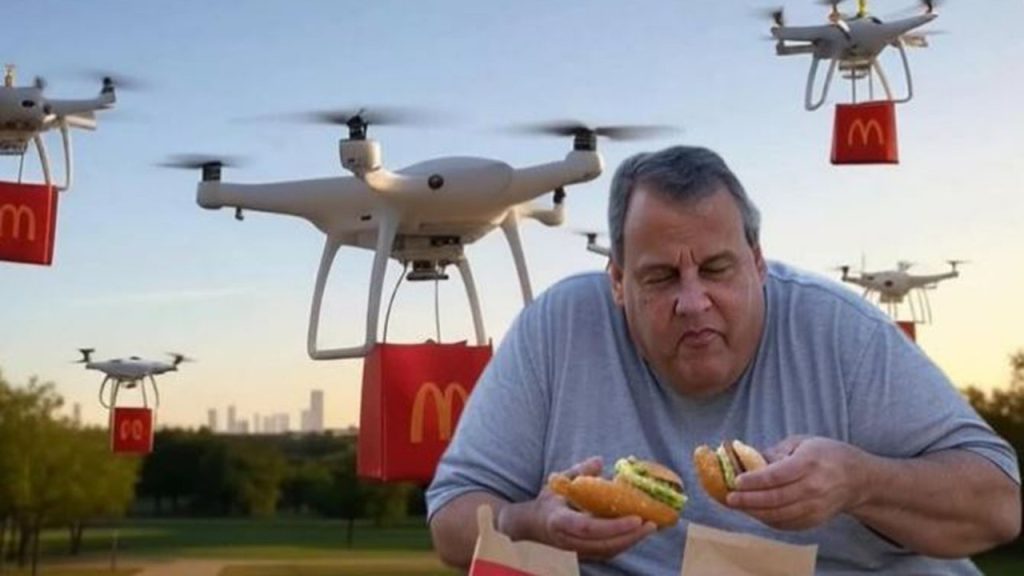The ongoing saga of unexplained drone sightings across the United States took a bizarre turn when former President Donald Trump injected his signature brand of political drama into the narrative. Leveraging the mystery surrounding the drones, Trump took aim at his former ally and current political adversary, Chris Christie, with a social media post mocking Christie’s weight. The post, featuring a manipulated image of Christie consuming fast food delivered by drones, resurfaced the long-standing and often personal feud between the two prominent Republican figures. This incident underscores the complex and often volatile nature of Trump’s political relationships, his tendency to utilize social media for personal attacks, and his willingness to exploit current events, even those involving national security concerns, for political point-scoring.
The drone sightings themselves have become a source of growing concern and speculation. Reports of these unidentified aerial vehicles have emerged from various locations across the country, including sensitive military installations, raising questions about potential security breaches and the government’s awareness of these activities. While authorities, including New Jersey Governor Phil Murphy, have downplayed the immediate threat to public safety, the lack of concrete explanations for the drones’ presence has fueled public unease and prompted calls for greater transparency and decisive action. Trump’s call to “shoot them down” reflects a growing impatience with the ambiguity surrounding the situation and adds another layer of complexity to an already perplexing issue.
The intersection of the drone controversy and Trump’s personal attack on Christie highlights the former president’s continued influence and his penchant for injecting himself into the national conversation, even in unconventional ways. The incident serves as a reminder of Trump’s ongoing presence in the political landscape and his ability to command attention, even amidst broader national concerns. His use of the drone incident as a platform to mock Christie underscores the deeply personal nature of his political rivalries and his willingness to leverage any opportunity to settle scores or disparage his opponents.
The history between Trump and Christie is a tangled web of shifting alliances and bitter betrayals. Once a staunch supporter and advisor, Christie played a crucial role in Trump’s 2016 presidential campaign. However, their relationship soured following Trump’s election, culminating in Christie’s dismissal as the head of the presidential transition team. The two have since traded barbs publicly, with Christie becoming an increasingly vocal critic of Trump’s character and leadership. Christie’s short-lived bid for the 2024 Republican presidential nomination saw him directly challenge Trump, labeling him a “coward” and a “puppet of Putin” – accusations that undoubtedly deepened the animosity between them.
Trump’s repeated targeting of Christie’s weight reveals a pattern of personal attacks that often characterize his political engagements. His comments have been criticized for being insensitive and demeaning, demonstrating a disregard for the norms of political discourse. While body shaming has become a recurring theme in Trump’s rhetoric, his focus on Christie’s weight suggests a particularly personal dimension to their feud. This tendency to resort to personal attacks, often unrelated to policy or substance, further polarizes the political climate and detracts from serious discussions about important issues.
The drone incident, initially a matter of national security concern, has been transformed into a stage for political theater, highlighting the blurring lines between serious issues and personal vendettas in the contemporary political landscape. Trump’s intervention reflects a broader trend of politicizing national security matters and using them as fodder for personal attacks. This behavior not only trivializes important issues but also potentially undermines public trust in government and institutions responsible for national security. The episode serves as a microcosm of the current political climate, where personal grievances often overshadow substantive policy debates and where social media platforms become amplifiers for divisive rhetoric. The incident underscores the need for more responsible and respectful political discourse, particularly when addressing matters of national security and public concern.

